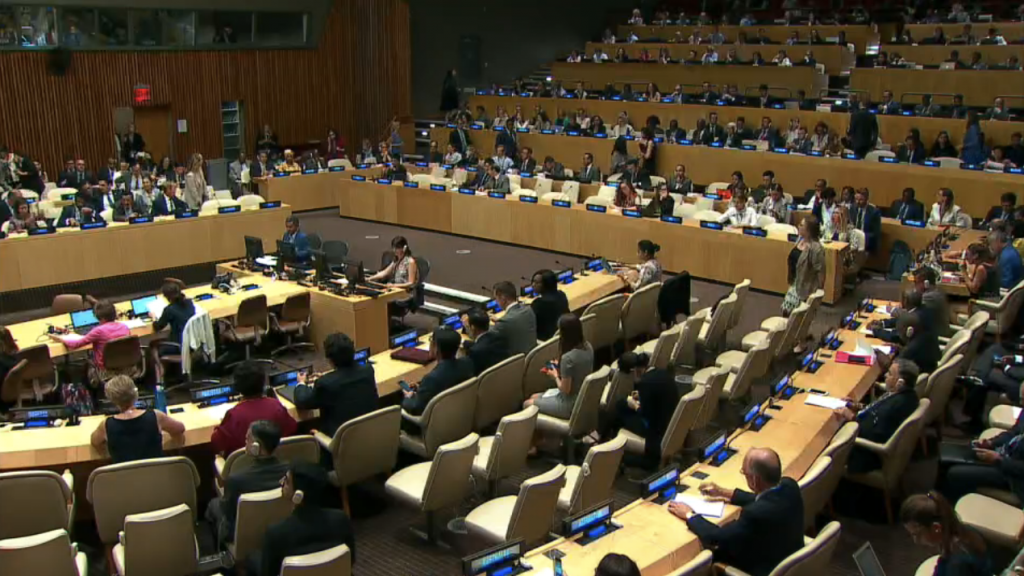Statement by Mr. Sergey Kononuchenko, Deputy Permanent Representative of the Russian Federation to the United Nations, on the presentation of the report of the Secretary-General on advancing the United Nations development system
Mister Chairman,
I thank Secretary-General for the delivered presentation. We have carefully studied the report, which, unfortunately, raises not hopes, but rather serious concerns for the future of the United Nations development system (UNDS).
Most conclusions and recommendations contained therein extend beyond the framework of mandates, agreed by Member States in the Quadrennial comprehensive policy review of operational activities for development of the United Nations system (QCPR). It is obviously an attempt to weaken control by Member States over the system paired with occasional neglects of national ownership principle. This is reflected both in misinterpretations of the 2030 Agenda for sustainable development and the QCPR.
The list of questions to the report is rather long. I’ll dwell on several points of utmost importance.
1. In the GA resolution 71/243 (QCPR) the governments have decided to conduct a selective tuning of the UNDS in order to fortify transparency, coherence and accountability to Member States. Any reform, especially a fundamental one, is out of the question.
In this regard we are seriously concerned with the presented recommendations on the merger of development and humanitarian approaches as well as the endorsement of the “New Ways of Working” document, which is not intergovernmentally agreed. An attempt to introduce conflict prevention in the work of the UNDS is also inappropriate. This contradicts the very first guiding principle of the QCPR, directly prescribing the system “to respond to the development needs of programme countries”.
2. The suggestions to create new entities like the so-called “steering committee” and an independent evaluation unit, anchored to the Executive Office of the SG, are not adequately substantiated. The essence of the QCPR provisions was to strengthen accountability and effective interaction of current divisions with Member States, to create transparent and clear working methods but not to bureaucratize and entangle the organizational structure.
Besides what staffing and budgetary implications will be associated with these steps? Why the issues of coordination and evaluation cannot be regulated within the acting structures, such as Chief Executives Board for Coordination (CEB), United Nations Evaluation Group (UNEG) and the Joint Inspection Unit (JIU)?
3. The report outlines substantial gaps in the work of the UNDS in the context of the Sustainable Development Goals: water and sanitation, affordable and clean energy, responsible consumption and production, industry, infrastructure and the environment. At the same time there are no considerable recommendations thereto.
Furthermore, the UNDS continues to be forced to work in the field of human rights and sustaining peace.
4. I would specifically like to underline the unjustified extension of the UN Secretariat authority. Though the QCPR does not contain a single mandate on the subject, for some reason these recommendations constitute the lion’s share of the report.
First of all it applies to the transition of chairmanship in the UN Development Group to the Deputy Secretary-General. Alongside with the reassessment of the principles of the UN country teams assembling, as well as the proposed line to transform Resident Coordinators from operational managers into political actors, we see this recommendation as a step towards the centralization of governance over the UNDS. As a matter of fact, such measure is undermining the neutral and universal nature of the current decision-making mechanism and creates a legal backdoor instrument to endorse politically biased standards of the operational activities while evading Member States’ approval.
The fundamental principle of the QCPR is the ownership and leadership of national governments in the area of sustainable development. This applies both to determination of national development priorities, strategies and policies as well as to related issues of forming the country teams, methods of their interaction with national governments and formulation of their final objectives, particularly the UN Development Assistance Framework (UNDAF).
Besides, the QCPR has reaffirmed that the RC system is owned by the UNDS as the whole, which means that all matters regarding reconstruction of their profile, selection and evaluation process are subject to discussion and affirmation by Member States, based on consensus. The consequences of disregarding this principle would be grave – to the point of total loss of credibility with the programme countries.
5. Proposed innovations on the HQ level also have insufficient evidence. This applies to gradual merger of all Executive Boards of UN development agencies based in New York. Even if we ignore illegitimacy of UN Secretariat intervention into the work of the boards, differences in their membership and, moreover, specific mandates of individual agencies, the effectiveness of such measure is highly doubtful.
Mister Chairman,
The QCPR provisions unambiguously intend to fortify transparency, responsiveness and accountability of the UNDS to Member States. The governments have defined the development system as a neutral, objective and trusted partner, and not as a conductor of norms and standards convenient to a close circle of prejudiced elements of the system. It was precisely the partner profile that was supposed to be strengthened during the formulation of the current report.
The proposed recommendations however do not take into account the existing demand of recipient countries for thematic services of the UNDS. Its conclusions are mostly speculative, they disrupt the current fragile balance and exceed the framework of both the QCPR directives and sustainable development pillar in general. It is doubtful that this controversial vision of available resources and capacities of the system can be utilized to guide the elaboration of effective proposals to improve its work.
Thank you for your attention.

